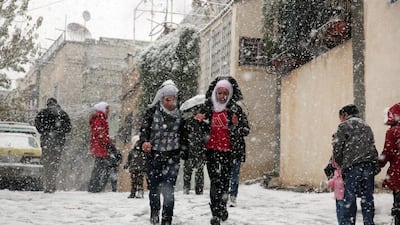ISTANBUL // Lebanese armed forces were called in to help distribute emergency aid to Syrian refugees, as the UN handed out fuel, blankets, heaters and food rations yesterday amid a third day of severe winter weather in the region.
A UN airlift of urgently needed food for tens of thousands of people in northeastern Syria, originally planned for Thursday, was delayed by snow, with officials saying they hoped to begin flights today, weather permitting.
Storm conditions, which have blanketed even eastern desert regions of Syria with a thick layer of snow, are expected to ease in coming days, although there will be little respite for millions of Syrians who have left their homes for draughty makeshift shelters in neighbouring countries and safer districts inside their own war-torn nation.
“Most internally displaced Syrians fled their homes with few belongings so they do not even have enough warm clothes or blankets to fend off the freezing weather. They desperately need fuel for heating and to cook the food they receive as humanitarian assistance,” said Matthew Hollingworth, Syria Country Director for the United Nation’s World Food Programme.
There were reports in Syria that a child and a baby died from the cold on Thursday, and an activist in a besieged rebel-held town said residents were struggling to stay warm with the electricity cut off and no food or fuel allowed in.
“Normally we face the shelling and fighting, as well as food and fuel shortages. Today we also have snow and extreme cold,” Abu Anas said from the town of Hara.
“We feel completely cut off from the world.”
In Damascus the WFP said it had begun distributing fuel for heating and cooking to refugees in 10 shelters, with fuel supplies slated for another 35 refugee shelters in the central cities of Homs and Hama, as well as outlying areas of Damascus over the coming days.
The United Nations High Commission for Refugees (UNHCR) plans to airlift 40 tonnes of food for 50,000-60,000 people into the northeastern province of Hasakha from Iraq.
Hasakha was devastated by drought in the years leading up to the March 2011 revolt, with many impoverished farmers already reliant on aid. Conditions have worsened since with the spreading conflict, and aid efforts have been hindered by heavy fighting and road closures.
All aid distributed inside Syria requires permission from the authorities, which have placed restrictions on agencies trying to help ease a humanitarian crisis from a war in which more than 120,000 people have been killed. UN convoys have repeatedly been refused permission to enter rebel-held areas, even close to Damascus, from where there have been reports of death by starvation.
The UN is planning to provide food aid to four million Syrians this month.
In Lebanon, which has taken in more than 800,000 Syria refugees, Wael About Faour, the acting social affairs minister, said the army was asked to assist in aid drops.
“There are 1,600 refugee [makeshift camps] in addition to 431 random camps, which makes it difficult to reach these places. That is why the cabinet had to ask for the help of the army to make as much aid reach those refugees as possible,” Mr Abou Faour said in comments published in Al Nahar newspaper yesterday.
Snow has covered the Bekaa valley, which borders Syria and has become home to thousands of displaced people.
In Jordan, officials involved with Zaatari, the largest refugee camp for Syrians, denied reports yesterday circulating on social media that a 7-year-old girl had died from hypothermia inside the camp, and said extra help was being provided.
“During the past 48 hours 10,000 blankets and 1,500 heaters have been distributed to refugees,” said Ghazi Sarhan, spokesman for Jordan’s Administration of Syrian Refugee Camps.
But the sheer scale of Zaatari, a UN-admininisted camp that is home to almost 75,000 people, left many feeling they had been left out.
“We have heard about aid, but we did not see anything, “ said Abu Wael, a refugee in the camp, coughing from the cold weather. “There were only three streets where ten blankets were distributed.”
Syria is now the largest and most complex global emergency the WFP is dealing with, it said yesterday.
Meanwhile the storm wreaked havoc in other parts of the region.
Jerusalem was paralysed by its fiercest snowstorm in years, with its mayor calling out the army to help stranded motorists and authorities urging residents to stay indoors.
Ramallah and Bethlehem were also coated in snow and some lower-lying areas suffered flooding from heavy rain.
The Gaza Strip was lashed by torrential rain for a third day, and its Hamas rulers said that residents had been evacuated from 60 flooded homes since storms hit the coastal territory on Wednesday.
Blizzards left thousands of drivers stranded in Iran.
“Rescuers have helped some 6,600 people and more than 1,700 vehicles that got stuck in the heavy snow” since Thursday morning, Mahmoud Mozafar, head of the local Red Crescent Society, told the ISNA news agency.
The storm also spread to Egypt yesterday, with some Cairo suburbs seeing snowfall for the first time in years, a weather official said.
psands@thenational.ae
* With additional reporting from Suha Maayeh in Amman and Agence France-Presse

